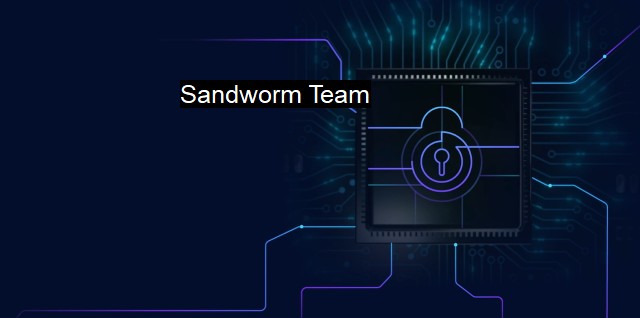What is Sandworm Team?
Sandworm Team: A Highly Advanced Cybersecurity Threat Targeting Critical Infrastructure Systems
Sandworm Team is a threat actor responsible for several serious attacks against global critical infrastructure and government organizations. It is known for targeted cyber-espionage campaigns and supports various traditional cybercrime activities. The group is allegedly connected to the Russian government, particularly the Russian General Staff Main Intelligence Directorate (GRU).This team of hackers first came to prominence in 2014, having been responsible for several distortive cyber-attacks worldwide. After their initiation, they have continuously improved their offensive toolkit, using distinct malware strains and leveraging zero-day exploits.
The name "Sandworm Team" was given by cybersecurity company CrowdStrike, borrowing from Frank Herbert's "Dune" series. Indeed, the hackers named their creations after characters and terms from these popular science fiction novels. Other researchers have also associated this group with names such as "Voodoo Bear," "Quedagh," "Iron Viking," and "Telebots" based on the techniques and exploits they use, their geographical targets, or the malware they deploy.
Much of the Sandworm Team's notoriety arises from its alleged involvement in some of the most highly-publicized cyber events in recent history.
This includes the BLACKENERGY campaign that knocked thousands of Ukrainian power grid users offline in 2015. They also allegedly developed and used the NotPetya ransomware for a devastating attack in 2017, causing billions of dollars in damages across numerous countries, including Ukraine, Russia, Denmark, the UK, and the US.
Sandworm Team has targeted various sectors, proving its versatility and targeting capabilities. Industries ranging from government, media, energy, railway, and many more have been victim to their highly coordinated attacks. The notorious group carries out initial intrusion usually through spear-phishing, watering hole attacks, or by exploiting weak points in public-facing servers. Once inside the targeted network, they search for valuable data or attempt to achieve their malicious objectives.
Followers of the cybersecurity landscape will immediately remember the retaliatory attacks that rattled the 2018 Pyeongchang Winter Olympics. Investigations attributed these attacks to the Sandworm Team, labeling the attack as a response to the Olympic ban on Russian athletes due to doping allegations.
The group is also well-known for exploring and deploying an array of sophisticated techniques and tools, which overall signify a high operational capacity. Over the years, they have built a robust framework consisting of numerous custom-made tools that can take over a variety of systems.
Sandworm represents one of the most severe cybersecurity threats due to the extent of damage they can inflict. Similar to other high-tier cyber-espionage groups, Sandworm's operations and obfuscation techniques make it incredibly challenging for IT professionals and antivirus companies to counter them.
Traditional defense measures are typically inadequate to deal with a threat of Sandworm's sophistication. Consequently, it isn't surprising that governments, corporations, and cybersecurity firms are investing resources into advanced threat intelligence and incident response capabilities to face such threats.
It’s often speculated that the Sandworm Team works at the behest of the Russian government based on their targets being consistent with Russian national interests. Western authorities like the US, UK, and others have formally charged members of the team in absentia for their role in these attacks.
Sandworm Team illustrates the current landscape of cyber warfare and espionage, where the lines are blurred between the actions of individual malicious actors and state-sponsored activities. Their operations have and will continue to shape the field of cybersecurity, prompting significant advancements in defensive technologies. Their actions have inadvertently accelerated the push towards building inherent security and toss the flawed age-old cyber defense philosophy of “Trust but Verify," to embrace "Never Trust, Always Verify."

Sandworm Team FAQs
What is Sandworm Team?
Sandworm Team is a Russian-based hacking group that is notorious for carrying out various cyber-attacks that target government organizations, energy companies, and other critical infrastructure systems.What are some notable attacks carried out by Sandworm Team?
Sandworm Team is responsible for the NotPetya ransomware attack, which caused billions of dollars in damage to various organizations worldwide. They are also known for the BlackEnergy malware attack, which targeted Ukrainian energy facilities and caused a power outage that affected over 225,000 people.What is the motive behind the attacks by Sandworm Team?
The exact motive behind Sandworm Team's attacks is not known, but it is believed that they are state-sponsored and aimed at disrupting the operations of rival countries' critical infrastructure systems.How can organizations protect themselves from Sandworm Team attacks?
Organizations can protect themselves from Sandworm Team attacks by implementing robust cybersecurity measures, including using updated antivirus software, conducting regular security audits, and training their employees on how to identify and respond to potential cyber threats.| | A | | | B | | | C | | | D | | | E | | | F | | | G | | | H | | | I | | | J | | | K | | | L | | | M | |
| | N | | | O | | | P | | | Q | | | R | | | S | | | T | | | U | | | V | | | W | | | X | | | Y | | | Z | |
| | 1 | | | 2 | | | 3 | | | 4 | | | 7 | | | 8 | | |||||||